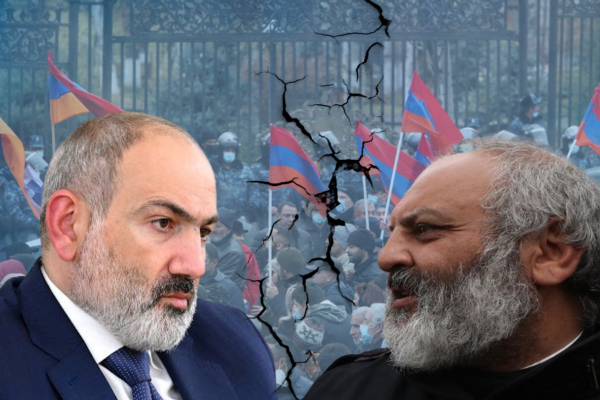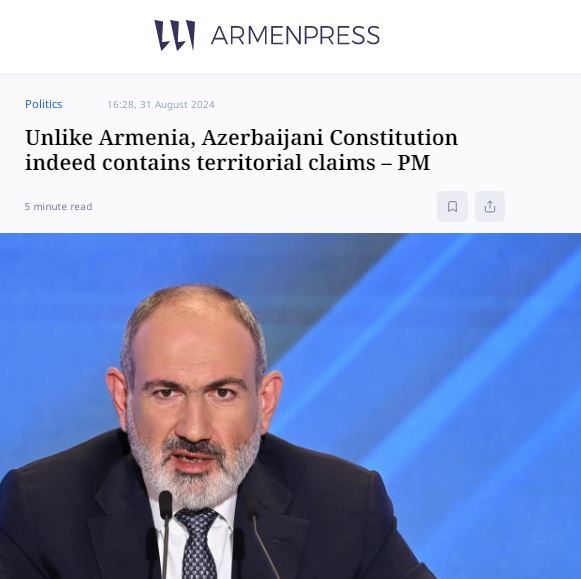|
|
TODAY.AZ / Analytics
Pashinyan’s absence sparks chaos in Armenia: Archbishop reappears
23 September 2024 [16:42] - TODAY.AZ

Armenian Prime Minister Nikol Pashinyan has embarked on a working visit to New York, USA, where he will participate in the 79th session of the UN General Assembly. According to Armenian media, during the visit, the prime minister is expected to meet with UN Secretary-General António Guterres. Additionally, reports in the Turkish press indicate that a meeting between Pashinyan and Erdogan might take place.
Pashinyan’s visit to the West has given momentum to the activities of revanchist forces that still maintain influence in Armenia. Leading protests against Pashinyan, Archbishop Bagrat Galstanyan held a large gathering at the Karen Demirchyan Sports and Concert Complex, calling on political forces to unite against the prime minister. He declared that this meeting would mark the beginning of a decisive phase in their struggle.
It is worth recalling that the protests led by Galstanyan, which began on April 19, were primarily sparked by the initiation of the delimitation of the border between Yerevan and Baku in the Tavush region. In early May, Galstanyan led a march from Tavush to Yerevan and has repeatedly called for Pashinyan’s resignation, even announcing his candidacy for the office of prime minister.
As Pashinyan leaves the country for a few days, the clergyman, who continues to incite rebellion among the Armenian people, seems to pose ongoing challenges for the PM.
Meanwhile, former judge of the Armenian Constitutional Court Kim Balayan has criticized the prosecutor general of Armenia for not accusing Pashinyan of treason. Balayan considers Pashinyan's recognition of Garabagh as part of Azerbaijan to be an act of treason against Armenia. He argues that the prime minister's actions, amid what he describes as the mass "deportation" of Armenians from Garabagh, should have legal consequences.
Interestingly, Balayan expressed regret over his son Tigran Balayan, a lawyer who joined Galstanyan’s "Tavush for the Homeland" protest movement and who currently serves as Armenia’s representative to Belgium and the EU.
It is clear that all forces attempting to manipulate the media during the prime minister’s absence are working in parallel. Galstanyan, on the other hand, indirectly aspires to overthrow Pashinyan and bring justice to Armenians, whom he claims have been “occupied” by Azerbaijan.
What, then, will happen to the peace agreement between Azerbaijan and Armenia?
Time is running out for the signing of a peace agreement between Azerbaijan and Armenia. As this issue remains unresolved and continues to be delayed, new orders for provocations are being given to Armenian soldiers at the border, biassed Armenian statements are surfacing in the media, and efforts are being made to frame Garabagh once again as Armenian territory.
Despite Baku repeatedly presenting the necessary and essential conditions for peace to the Armenian side, the leadership in Yerevan continues to delay the process with various excuses, failing to meet the conditions. Yet Baku's demands for peace are the most basic principles that should be followed between two states. These principles include, first of all, the security of the borders and both countries' respect for each other's territorial integrity, as well as the cessation of territorial claims by the Armenian side against Azerbaijan. These principles, in particular, hold Armenia accountable given the recent provocations on the border.
In addition, the Armenian prime minister's tit-for-tat approach to territorial claims reveals further doubts about Yerevan's unwillingness to settle with Baku.
Pashinyan first expressed his agreement to change the Armenian constitution, then additions were made to it. Later, the Armenian Prime Minister stated that there are no territorial claims in the constitution of his country. Some time ago, Pashinyan put forward in the form of a claim that these claims are in the constitution of Azerbaijan, not Armenia. It is understood that internal pressures and theses transmitted from abroad have pushed the head of the government to change his opinion.

At present, even these two simple conditions seem to be the heaviest commitment for Armenia. Sometimes in the press and sometimes in his statements, Pashinyan makes excuses with his contradictory opinions and tries to avoid obligations with all his might. In the end, Pashinyan's absence from the country for only a few days intensified the internal crisis. Political and non-political opposition and revanchist forces continue to demand Pashinyan's resignation. Pashinyan should just understand that fulfilling his obligations to Azerbaijan saves his future from imminent threats. Because every step Pashinyan has taken so far has turned him into a traitor to the country in front of the opposition forces - which once again emphasises the need to change the country's constitution in order to protect the principle of a safe neighborhood.
URL: http://www.today.az/news/analytics/253254.html
 Print version
Print version
Connect with us. Get latest news and updates.
See Also
- 15 November 2024 [20:25]
Pashinyan's allegation augurs Armenia's deviation from peace talks - 15 November 2024 [17:02]
US Department of Labor pushes for worker-centered just transition at COP29 [COMMENTARY] - 14 November 2024 [20:55]
Azerbaijan’s COP29 presidency sets precedent with focus on amplifying voices of vulnerable nations - 08 November 2024 [18:57]
Liberation of Shusha: Intersection of History and Strategy - 07 November 2024 [20:45]
From press to politics or sympathy to hatred: Gallup's downbeat survey on Pashinyan's rating - 01 November 2024 [11:05]
Sustainable development is one of goals of COP29 - 31 October 2024 [13:50]
New trains, green lanes: Azerbaijan's journey to COP29 readiness - 28 October 2024 [17:10]
Lukewarm wishes from Yerevan - How sincere is Pashinyan in congratulating his Georgian counterpart? - 25 October 2024 [09:00]
Azerbaijan expands IFC partnership to enhance energy efficiency and sustainable development - 24 October 2024 [16:54]
Georgia under Western pressure
Most Popular
 Azerbaijan's Leadership at COP29: Addressing Global Climate Challenges and Exposing Hypocrisy
Azerbaijan's Leadership at COP29: Addressing Global Climate Challenges and Exposing Hypocrisy
 Provocateur Le Pen go to jail
Provocateur Le Pen go to jail
 Macron Stung by President Ilham Aliyev's Truth: French Minister Ordered to Skip Baku Visit
Macron Stung by President Ilham Aliyev's Truth: French Minister Ordered to Skip Baku Visit
 Who uses Greta Thunberg and how?
Who uses Greta Thunberg and how?
 Climate Platform for business, investment & philanthropy launched within COP29
Climate Platform for business, investment & philanthropy launched within COP29
 United States announced plans to deepen security cooperation with Indonesia
United States announced plans to deepen security cooperation with Indonesia
 Azerbaijan’s COP29 presidency sets precedent with focus on amplifying voices of vulnerable nations
Azerbaijan’s COP29 presidency sets precedent with focus on amplifying voices of vulnerable nations
